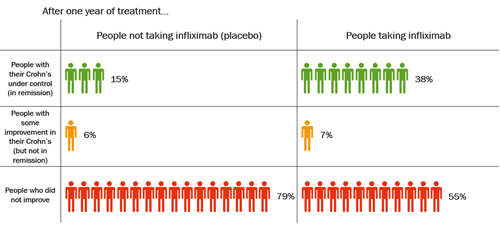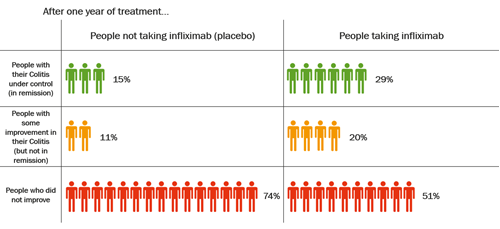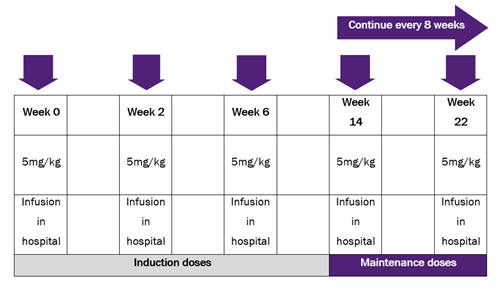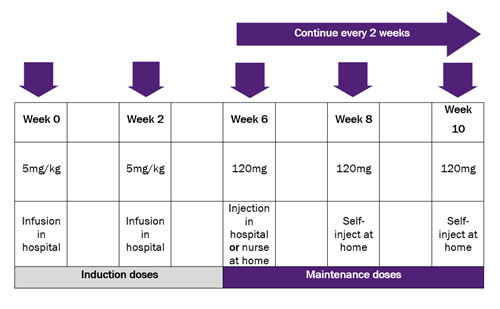Fertility
Infliximab is not thought to affect male or female fertility.
Planning a pregnancy
Speak to your IBD team if you are offered or are taking infliximab and want to start a family. They can help you make an informed decision about your care and your baby's safety.
Do not stop taking your medicine without talking to your doctor first.
Stopping your medicine may increase your risk of a flare-up. Having active Crohn’s or Colitis can increase the risk of pregnancy complications, such as:
- Premature birth
- Low birth weight
- Miscarriage
This is why it is important to keep your condition under control during pregnancy.
Infliximab is generally considered safe to take during pregnancy. Research shows that it is unlikely to affect your pregnancy or harm an unborn baby. Long-term health, infection rates and development do not appear to be affected in children with a parent who took anti-TNFs, like infliximab, during pregnancy.
It is possible for infliximab to cross the placenta and enter your baby’s blood. This may happen in mid to late pregnancy, during the late second and third trimester. To be cautious, drug companies advise using contraception to prevent pregnancy while taking infliximab and for at least six months after your last dose. They also suggest that infliximab should only be used during pregnancy if needed to keep your condition under control.
However, many people will be advised by their healthcare professionals to continue taking infliximab throughout their pregnancy. This can help manage their condition effectively and reduce flare-ups. Flare-ups can increase the risk of pregnancy complications.
If your Crohn’s or Colitis is well controlled, your IBD team may advise that you take infliximab for the first six months of your pregnancy only. This aims to reduce the exposure of your baby. If your condition is not well controlled, your IBD team may recommend you take infliximab throughout your pregnancy.
If you have an unplanned pregnancy
Contact your IBD team straight away if you are on infliximab and find out that you are pregnant. Do not stop taking your medicine until you have spoken to your healthcare professional.
Your baby and live vaccines
Tell your baby’s healthcare team if you were taking infliximab during your pregnancy. Taking infliximab during pregnancy may affect when your baby can have live vaccines. This includes the rotavirus vaccine and the BCG vaccine for tuberculosis. The BCG vaccine is not routinely given as part of the NHS vaccination schedule but is sometimes recommended. Taking infliximab during pregnancy should not affect the rest of your baby’s vaccination schedule.
If you take infliximab during pregnancy, you may be told that your baby should not have live vaccines until they’re a bit older. National guidelines state that you may need to wait until your baby is between six and 12 months old or until infliximab can not be found in the baby’s blood. The manufacturers of infliximab recommend to wait until at least 12 months old. But sometimes the benefit of giving a live vaccine earlier might be greater than the potential risk.
You might want to discuss this with your IBD team and your baby’s healthcare team. Decisions on what vaccines your baby should have and when will be made on an individual basis. Your IBD team and midwife or baby’s healthcare team should be able to help you make a decision.
If you take infliximab, you should take extra care if they have the rotavirus vaccine. Live virus can be shed in the baby’s poo for up to 14 days. Make sure you wash your hands and/or wear gloves when changing their nappy.
There is some evidence that your baby may be more prone to infections if you take azathioprine or mercaptopurine along with other anti-TNF medicines, like infliximab.
Discuss the risks and benefits of taking infliximab while you are pregnant with your IBD team. You can also find out more in our information on pregnancy and birth, postnatal care and breastfeeding, and reproductive health.







 Become a member: Find out about the benefits of joining our amazing community
Become a member: Find out about the benefits of joining our amazing community